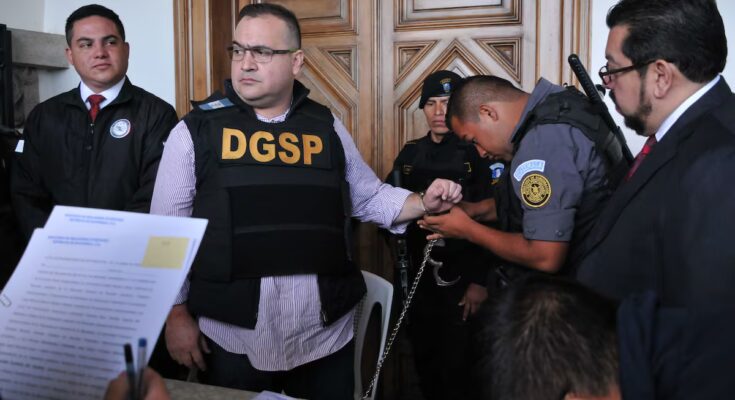Federal judge Ángela Zamorano Herrera rejected the request for early release of former Veracruz governor Javier Duarte (2010-2016). With this resolution, the PRI politician must serve to the end the nine-year sentence imposed on him for criminal association, diversion of resources from the State of Veracruz and money laundering. Duarte’s sentence, which he is serving in Mexico City’s North Prison, will end in April 2026, five months from now. Judge Zamorano, head of the justice center attached to that prison, concluded on Friday that the former governor, one of the greatest symbols of the PRI’s political corruption, does not meet the requirements of good behavior established by law to be eligible for the benefit of early release.
Duarte’s defense, led by lawyer Pablo Campuzano, had asked for his early release, given that the politician from Veracruz has already served more than 70% of his prison sentence, another of the warnings provided by the legislation for early release. However, the former governor did not pass the test of good conduct, despite the arguments presented by Duarte’s defense witnesses, mostly officials from the Reclusorio Norte itself, who spoke in his favor. During the two-week trial, the General Prosecutor’s Office (FGR) called prosecutors who confirmed that the PRI member’s behavior was far from exemplary, despite him having already served 95% of his sentence.
The hearing in which Duarte’s release was decided took place in stages and with setbacks. The first appearance in which the former governor’s defense made its request was on November 3, as EL PAÍS reported exclusively. That day, Judge Zamorano set a hearing in which he would dictate his decision for November 12. However, without warning, one day the appearance was brought forward, because the witnesses that the Attorney General’s Office, prosecutors of Veracruz, would have presented, were unable to appear on the agreed date. On that occasion, Judge Zamorano, who took office as part of the judicial elections in June this year, gave voice to the witnesses presented by Duarte’s defense, and postponed the appearance of the Prosecutor’s witnesses until Wednesday of this week. Once again, the judge postponed issuing his decision until this Friday.
The FGR filed charges against the Veracruz politician’s request for early release. “He is not just any public official or any official. He was a governor who characterized himself as the architect of one of the biggest political and legal scandals in the country”, defended the representative of the FGR, Manuel Granados, in the first hearing on November 3. The former governor’s lawyer, Pablo Campuzano, insisted that Duarte, like any other person deprived of liberty, has the right to request the benefit of early release after serving a certain minimum portion of his sentence. The lawyer stressed that his client purged “excessively” what was imposed on him in 2018; According to his calculations, the Veracruz politician has served 95% of his sentence.
The witnesses in favor of the PRI politician, mostly officials from the Reclusorio Norte himself, defended his good conduct. On the contrary, the Prosecutor’s Office reported that illegal objects were found in Duarte’s cell, such as a pen with a camera, a mobile phone, a television and internet access. On Wednesday, Veracruz prosecutors described how the former governor delayed the advancement of other cases against him through crude tactics, such as citing health problems or withdrawing from hearings without the judge’s permission. In one case, they had to take him out of the cell and bring him tied to a chair before the judge. According to newspaper reports, Duarte was present and calmly listened to the arguments of witnesses accusing him of misconduct.
Although it is a right recognized by law, the early release of the former president has sparked enormous debate among Mexican public opinion. Duarte governed Veracruz in a period marked by the return of the PRI to the presidency of Mexico, with Enrique Peña Nieto at the helm, after two six-year terms much criticized by PAN governments. The “new PRI” presented itself as a generation of younger, more academically prepared and highly technical politicians, who promised a contrast with the old party that governed the country in the last century. Soon, however, these politicians found themselves embroiled in huge corruption scandals, from the president to the governors.
Duarte was one of these and stood out among all in matters of corruption through the use of shell companies and frontmen. He was convicted for the diversion of 1,670 million pesos in September 2018. The sentence imposed on him begins to run from April 2017, the date on which he was arrested and extradited from Guatemala, where he had fled. Months earlier, in October 2016, Duarte had requested a leave of absence from the Veracruz governorate, 48 days before the end of his six-year term, thus ensuring that he would make himself available to the authorities in the face of growing pressure due to corruption scandals in his government. In the end, however, he fled to the Central American country.
Years later, Duarte declared in court that his early resignation from office and his flight to Guatemala were a request of Peña Nieto’s leader, who, through the Minister of the Interior, Miguel Ángel Osorio Chong, informed him that a “soft transition” was needed in Veracruz, he claimed. Political animal. The Duarte scandals had hit hard the already battered reputation of the Peña Nieto government, which was itself mired in serious scandals of resource diversion and corruption at the federal level. By now, the conflict of interests that lay behind the presidential “white house” and the corruption network that made the awarding of the Mexico-Querétaro train contract possible, not to mention the The Ayotzinapa case and traces of complicity of public officials. In an attempt to limit the damage, the PRI expelled Duarte from its ranks, which is telling, because in the Mexican imagination the former governor is inevitably associated with the country’s longest-standing party.
However, the sentence imposed on Duarte in 2018, nine years in prison and the payment of a fine of almost 59,000 pesos, in addition to the seizure of numerous properties, did not measure the true extent of the diversions in Veracruz. A report from Political animal AND MCCI He highlighted the use of a network of 400 paper companies to siphon 3,617 million pesos from the Veracruz treasury. Second Millenniumthe Superior Audit of the Federation documented that during Duarte’s six-year term, more than 62 billion pesos of federal funds intended for health, education, security and infrastructure were used irregularly. This is the largest looting ever recorded at the state level. However, neither Duarte nor the political leadership that helped him disappear huge amounts of money have been held accountable in court.
The former governor asked to be released early from prison because, he argued, he has been away from his family all this time, in addition to his exemplary rehabilitation. Duarte’s wife, Karime Macías, identified as part of the PRI politician’s corruption network, has lived in London for years. More than eight years ago Duarte pleaded guilty to undergo an abbreviated trial, but has now said he accepts his responsibility “for political reasons”. While serving his sentence, the former governor faced another charge for obstructing the investigation of a case of enforced disappearance, a crime that escalated during his administration with the participation of state police. However, a federal judge exonerated him from this charge in November 2024, which paved the way for him to request his early release.
Two weeks ago, EL PAÍS reported that Duarte took the success of his request for granted, as his cellmates threw him a farewell party and gave him, as if they were an inheritance, items that he would no longer need after his release. With Judge Zamorano’s decision, Duarte’s prophecy has been frustrated.



